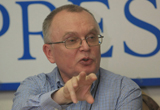 President Medvedev recently signed a new healthcare law. This is the final step of enacting the legislation in Russia. It has taken 13 months to get from the first draft of the bill to it being signed in—a record length of time in Putin’s Russia, where laws usually run through the legislators’ house in a couple of months. The law was delayed because the draft was of low quality. The industry, physicians’ organisations, and patients’ unions all opposed many wrongly formulated, or senseless articles of the law. The text of the law was changed substantially, but not only in the interests of patients and the medical profession. The law is controversial and outdated in many ways. For example, the law initially states that healthcare interventions will only be provided after informed consent is given by the patient. But the article about terminal care explicitly forbids the discontinuation of interventions if a patient asks for it.
President Medvedev recently signed a new healthcare law. This is the final step of enacting the legislation in Russia. It has taken 13 months to get from the first draft of the bill to it being signed in—a record length of time in Putin’s Russia, where laws usually run through the legislators’ house in a couple of months. The law was delayed because the draft was of low quality. The industry, physicians’ organisations, and patients’ unions all opposed many wrongly formulated, or senseless articles of the law. The text of the law was changed substantially, but not only in the interests of patients and the medical profession. The law is controversial and outdated in many ways. For example, the law initially states that healthcare interventions will only be provided after informed consent is given by the patient. But the article about terminal care explicitly forbids the discontinuation of interventions if a patient asks for it.
The law describes brain stem death, but only with regard to organ donation. At the same time it has no definition or regulation on the vegetative state (cortex death). Even though there is total distrust in transplantation in Russia, the law furthers a model of presumed consent, and for the first time applies presumed consent for child organ donation.
It also explicitly opens the door for medical school graduates without a residency permit to practise medicine in Russia. The law was passed by Russian legislators at the last sitting of the
legislative body before the general election. It is fair to say that on 4 December 2011 we did all vote, but these were not elections, as all the parties except for Putin’s party were severely restricted in their access to media.
The protests that followed in Moscow, Saint Petersburg, and other cities have been brutally suppressed. During the first days of the protests at least 1100 people were arrested and held in temporary detention for about two days without food. In Moscow the imprisoned protesters were fed only thanks to the donation of food from the humanitarian foundation chaired by the well known doctor, Liza Glinka (http://doctorliza.ru/).
On 7 December the crossroads in the Moscow city centre were occupied by special police forces. They entered the city on 5 December. It is the special division of the NKVD (now the Internal forces of the Ministry of Internal Affairs) still named after the legendary VChK/KGB founder Dzerzhinskii. When the smoke disappears, the new government and legislators, which have dubious legitimacy, will work hard to implement the new healthcare law with scarce funds and impoverished physicians.
Vasiliy Vlassov is a Professor of medicine at the Higher School of Economics, Moscow. His research interests are in epidemiology, evaluation of diagnostic tests, public health, and especially health care delivery with scarce resources. He is the co-founder and current president of the Russian Society for Evidence Based Medicine.
